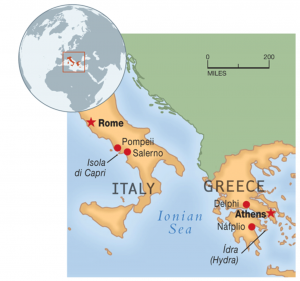I have traveled to several foreign countries, but have never been to Latin America; additionally, while I have taken part in service programs in other states, I have never participated in a service-learning program in another country. I have, however, been a tourist on multiple occasions.
When I was younger, my family and I traveled to London, England and Paris, France. Looking back, everything about our trip (where we stayed, visited, and ate) was “touristy.” The trip was truly fascinating, and I was able to visit many historical sites and learn about the history and culture of both countries. However, because we were true tourists, I wonder if we missed pieces of the true culture and history by only visiting, eating, and shopping at locations that are popular attractions for tourists.
In 2012, I went on a National Geographic Student Expedition to Italy and Greece. On the trip, I was on the photography team. At times, I felt like a tourist, but in general I felt more like an “explorer.” In large cities, such as Rome and Athens, I felt like a tourist. But in small towns in Italy and Greece, I did not feel this way. As part of our daily photography assignments, a few classmates and I would be given the liberty of wandering the Italian or Greek streets; in those moments I did not feel like a tourist, but more of what I would describe as an “explorer.”

A map indicating the cities I visited in Italy and Greece
I personally do not see anything wrong with being a tourist. However, I think there are distinct advantages to avoiding popular tourist attractions and becoming an “explorer.” Often times, touristy locations are manufactured to remain exactly the same, so that each tourist will have a similar experience. While this allows the historical appearance to remain, I think it takes away from experiencing a country’s true culture. While I have never traveled to Latin America, I wonder if this logic holds true there too.
